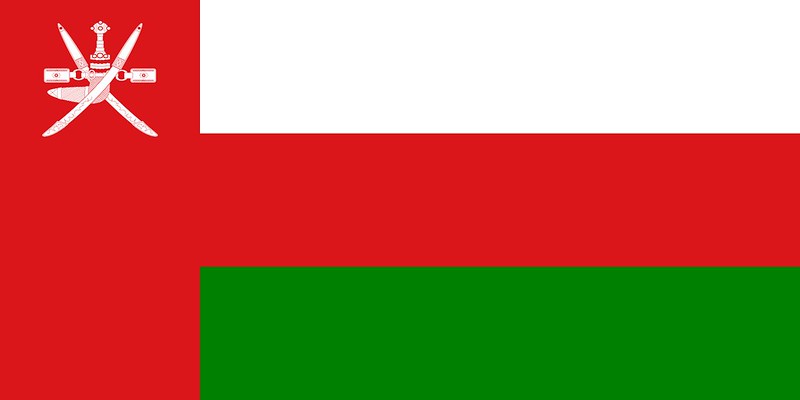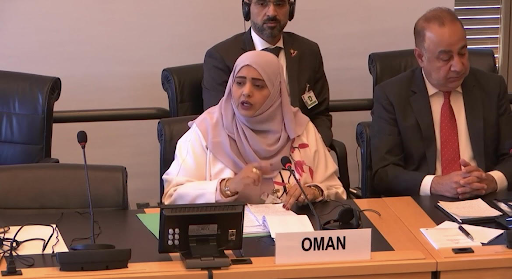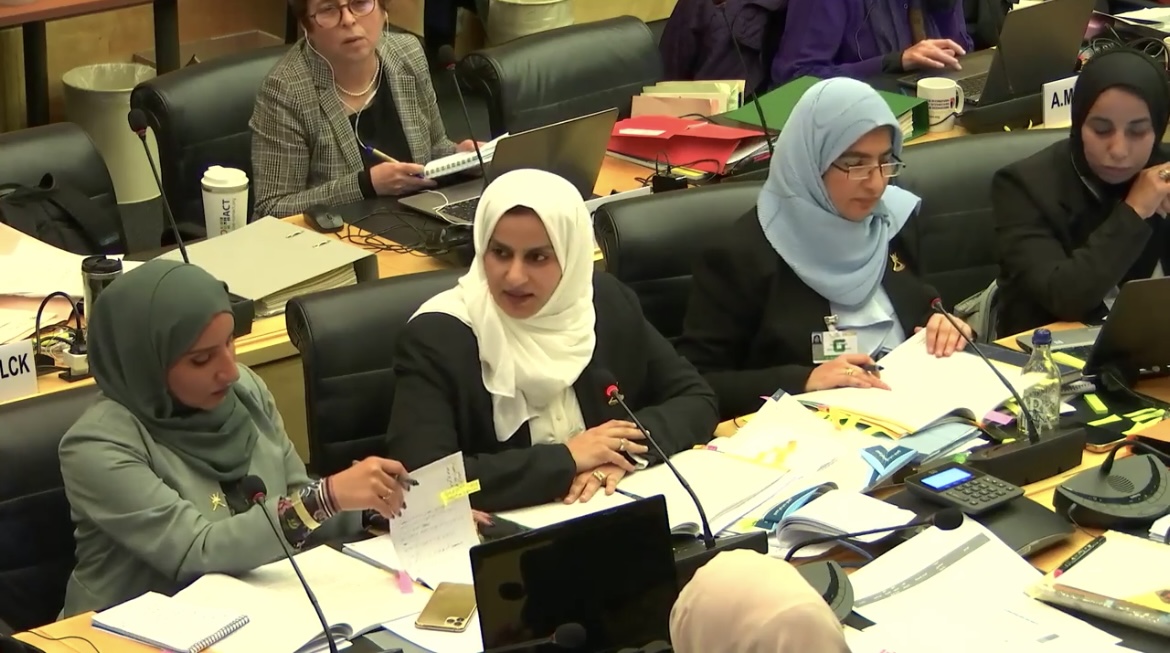Committee on the Rights of the Child (CRC)
Review of the Sultanate of Oman
18 – 19 January 2023

By Sasha Granelli / GICJ
Executive Summary
On the 18th and 19th of January 2023, the Committee on the Rights of the Child (CRC) Working Group of the UN Human Rights Council conducted a combined fifth and sixth periodic report of Oman in the 2674th meeting of the 92nd session of the Committee.
As part of the interactive dialogue, Committee members raised several issues, such as: the juvenile judicial system, access to health services and education, nationality, child marriage, harmful practices, sexual mutilation of women, and childrens’ opinion.
𝐆𝐞𝐧𝐞𝐯𝐚 𝐈𝐧𝐭𝐞𝐫𝐧𝐚𝐭𝐢𝐨𝐧𝐚𝐥 𝐂𝐞𝐧𝐭𝐫𝐞 𝐟𝐨𝐫 𝐉𝐮𝐬𝐭𝐢𝐜𝐞, in line with the considerations of the Committee on the Rights of the Child, called on Oman to fully comply with its international obligations under the Convention of the Rights of the Child. As the Committee Experts underlined, important concerns are raised about violations of children rights in Oman which are also in contradiction with the Vienna Declaration which highlights the superiority of all human rights.
Background
The CRC is a body of 18 independent experts that monitors the implementation of the Convention on the Rights of the Child by its States parties. It also monitors the implementation of the Optional Protocols to the Convention, on the involvement of children in armed conflict and on the sale of children, child prostitution, and child pornography.The country in question presents reports following extensive national consultations with all relevant stakeholders, NGOs, and civil society organisations.
The Sultanate of Oman ratified the Convention on the Rights of the Child on December 9, 1996 and is part of the Optional Protocol on the sale of children, child prostitution, and child pornography and the Optional Protocol on the involvement of children in armed conflict.
The last review of the State by the Committee of the Rights of the Child was in 2016.
Progress made by the State
The Committee Experts commend Oman’s national strategy on children :
- Oman Vision 2040 : The five-year plan and the Sustainable Development Goals
- The National Strategy for Children 2016–2025

Statement of the Sultanate of Oman
On the 18th and 19th of January 2023, the Committee on the Rights of the Child concluded its consideration on the combined fifth and sixth periodic review of Oman, with Committee Experts commending the national strategy on children that the government presented. However, the Committee was also concerned about the situation of children without identity documents that continue to face discrimination and can’t access basic services. They also addressed the issue of harmful practices against children in different fields of society.
The Head of the delegation, Dr. Laila bint Ahmed bin Awad Al Najjar, Minister of social development, said that the national plan and policies are implemented to assess progress and ensure a greater level of conclusion and protection for all children. The delegation highlighted the implementing regulations of the Children’s Code, which cover such matters as definitions, child protection, kindergartens, alternative care, family custody, protection mechanisms, and sanctions. They also talked about the National Strategy for Children, which is being implemented by the relevant bodies and includes comprehensive, time-delineated and measurable goals. The Plan covers the areas of survival, health and well-being, education, development and capacity-building, protection, and participation.
Interactive Dialogue
The Committee commends Oman for its progress in its legislation, especially for children through the national strategy. However, they remain concerned about the question of child marriage and the judicial role in this. The Committee also asks more questions about the child protection committee and how it acts in front of multiple cases of abuse of children in schools and Koranic schools.
The implementation
The Committee reiterated their call for the amendment of the Children’s Code in order to clearly prohibit corporal punishment and the fact that it does not currently comply with the Convention.
To answer these questions, Oman wishes to note that its Children’s Code does, in fact, comply with the Convention. Moreover, the implementing regulations set forth the rights contained in the Code in greater detail and also cover areas related to the Convention.
Furthermore, they noted that the Oman Vision 2040, social action strategies 2016– 2025, and the Health Vision 2050 all contain several strategic directives aimed at achieving the rights of children, women, and persons with disabilities, while the social action strategies and the National Strategy for Children have both adopted a human rights-based approach with a view to guaranteeing children’s rights.
Health services and nationality
The Committee raised concerns about the access for children to health facilities, especially for the children who don’t have identity documents and are without any nationality because mothers still can not pass on their nationality to their children.
Despite the economic crisis caused by the COVID-19 pandemic and low oil revenues, Oman has nonetheless sought to allocate the necessary financial resources to ensure the health and safety of children. The delegation said that at the national level they took measures to fight the risk of pandemic. They highlighted their clear and strict politics that worked during the Covid 19.
In the line of health, Oman points out their vaccination obligation for children and their investment in health care in order to provide good services for all. They highlighted the training received by the medical staff to use data in health centres and how to provide good services for children. In the same vein, they highlighted the various campaigns carried out across the country to inform about diseases, the importance of vaccination for children and the risks of drug use or poor nutrition for adolescents.
The question of mental health was also quickly approached, since the delegation simply recalled that they deliver services in this regard in health services and religious services.
On another hand, the delegation said that the services provided to Omani or non-Omani children are the same. They have no migrants in Oman, there are only contract workers.
Oman noted that they support children with no parents and strengthen their access to all services by saying that all children in Oman have a nationality, no one is without any identity document.
Harmful practices and abuses
One of the COmmitte members, P.Jaffe insisted on questions about the child protection committee and how it acts in front of multiple cases of abuses of children in schools and koranic schools.

Concerning abuses, the Omani delegation claims that any type of abuse is punished and they impose all relevant protection measures in that type of case. They point out the Child protection committees and define them as 11 committees present all over Oman who work in the field of children law and are trained to deal with any reports or complaints concerning such abuses. There are specific ethics and qualities that they should have to be elected.
Concerning what happens in koranic schools or other schools or even in public, they claim to take the subject very seriously and ensure reports of all those events. They believe that schools must be in the position to tackle such situations. The delegation remembered that those acts are criminalised by the Penal Code and the Children Act which have provided punishment that can go to 15 years of imprisonment for sexual abuses.
Juvenile judicial system
Oman highlighted the adoption of new techniques to conduct the hearing with children where they make sure that there are relevant experts present. They present the establishment of a training program for the Omani police that started in 2022 to prepare a national team of 75 experts to deal with the cases of abusing children. Still they point out that children under 18 years can not be detained and they try to apply some corrective measures and correctional facilities for juveniles. They still try to implement the Declaration on the subject of detention and they recognise they still have progress to make.
Child marriage
On the subject of girls married under 18 years, the delegation remembered that the Social Status law has provided that eligibility for marriage is subject to reach the age of 18 and should be healthy. For Oman, underage marriages are not a phenomenon, it's minimally customary. The judge takes into account the best for the children and most of the time it’s girls that will turn 18 soon.
They also try to raise awareness on this subject with seminars with Omani families regarding the effect of girls' marriage. Marriage under 18 years can not be done without the authorisation of a judge, needs to be subjected to the child's best interest and referred to the ministry. They highlighted that marriage of girls under 18 is declining in Oman and adolescent mothers have dropped from 2.4 in 2016 to 1 in 2020.

Child Sale
At that point, the Committee raised concerns about the situation of Child sale and Child traffic that still happen in Oman, especially considering that the Optional Protocol on the sale of children is still not integrated in the national law. Therefore, the Committee asks for punishment against these crimes.
Concerning child labour, the delegation claimed to be monitoring the situation strictly. They only attest to the presence of traditional work within the families making the children work, sometimes very young. To justify these practices, they ensure that the child gives his consent, therefore not falling, according to them, into the child labour category.
Cooperation with civil society and respect of the Children Opinion
The Committee also urged the Government to cooperate with civil society and human rights defenders but also to integrate children and women concerned by the policies and the violations into the discussion.
They ensure that all the monitoring and prevention are made through a real discussion and cooperation with the civil society in order to improve the legislation. Furthermore, the delegation affirmed that children's opinions are respected and they engage in consultation with children in order to avoid discrimination like for children with disabilities.
Position of Geneva International Centre for Justice
Geneva International Centre for Justice (GICJ) welcomes the progress made by the Sultanate of Oman in the field of children’s rights. Unfortunately, there are still important concerns as the Convention of the Rights of the Child is still not yet totally implemented in the Omani legislation. Many children still face discrimination, violence, and no access to essential services such as education and health. As requested by the Committee, the State should seriously monitor the situation, raise more data, and act to meet its international obligations under the Convention on the Rights of the Child.
CRC, Committee_On_The_Rights_Of_a_Child Oman , human_rights , Geneva , justice , geneva4justice , GICJ , Geneva_International_Centre_for_Justice




